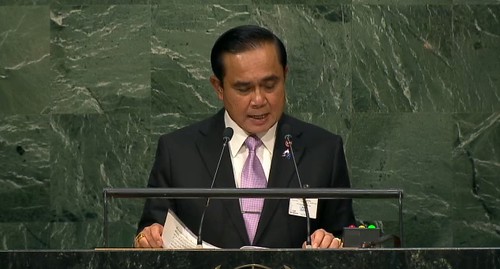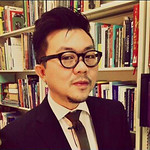
Prime Minister General Prayuth Chan-ocha at the UNGA Meeting last month.
Thailand aims high to become a non-permanent member of the United Nations Security Council (UNSC). The entire council consists of 15 members: five permanent ones (the United States, the United Kingdom, Russia, France and China) and 10 non-permanent members. Thailand last served in this position was during 1985-86. So far, the Association of Southeast Asian Nations (ASEAN) has endorsed Thailand’s bid to achieve this ambitious goal.
“We have a good reputation because of our role in the United Nations operations, especially in peacekeeping and security," said General Prayuth Chan-ocha, self-appointed prime minister. As reported in Bangkok Post, Thailand is competing for the seat with a two-year term in the Asia-Pacific quota at the council from 2017-18. The other contestant is Kazakhstan. The vote on the new five non-permanent members from different regions will take place in September 2016.
While this ambition might be admirable from the perspective of Thailand pushing for its diplomatic activism, the reality could be rather stark. Let’s begin with where it could go wrong for Thailand’s campaign to become the non-permanent member of the UNSC. It was perhaps because of the military coup that occurred in May 2014 that overthrew the elected government of Prime Minister Yingluck Shinwatra. Thailand has since been in the custody of the military regime.
Few countries in the world accept a military regime to serve in this prestigious position. But more than this, the problem with Thailand could also derive from other factors. Some argue that the lack of clear vision of what Thailand wishes to do as a non-permanent member of the UNSC might be responsible for a possible failure. Thailand’s agenda has been unclear, in comparison with that of Kazakhstan.
At the UNGA in New York last month, Prayuth spent too much time on “getting to know” small, insignificant states in the remote regions, instead f attempting to win support from permanent members of the UNSC. It is true that the process of selection is based on a one-country one-vote, but the endorsement from the permanent members of the UNSC could have an influence on the selection process. The fact that Thailand is under undemocratic regime also does not contribute positively to its campaign. It permits its contender to spend time targeting Thailand’s image.
Geopolitical factors also acts as an obstacle for Thailand. There was an international belief that the Prayuth government has leaned heavily on China, a sign that guaranteed the U.S. refutation of Thailand. Western diplomats, accordingly, are uncertain if Thailand could exercise neutrality as a non-permanent member of the UNSC. More troublingly, Thailand’s credibility come into serious question as a result of certain policy missteps committed by the Prayuth government, ranging from the violation of human rights in Thailand, the fact that Thailand is in the third tier of the US’s Trafficking in Persons Report, the deportations of the Rohingya and the Uighurs, as well as the delay in Thailand’s own political reforms.
Many years ago when Thaksin was in power, some of his blunt statements upset this international body. Thaksin once said, “The United Nations is not my father” which summed up the perception of Thailand regarding its respect and faith in the United Nations.
Thailand’s calibre and determination to lead the international body was in the past indubitable. But Thailand is a sick nation today. In my interviews with some of senior Thai diplomats, they are pessimistic about Thailand’s bid to serve in this position. Some also said that while General Prayuth promised to the meeting of the UNGA that his government would continue to defend a space for freedom of expression, in reality, this has never taken place. And the international community was not fooled by this empty promise.
Prayuth’s nomination of Thailand to compete for the position of a non-permanent member of the UNSC is the latest of his attempt to stamp the Thai presence on the world map at the time Thailand is facing a serious political crisis at home. It is unavoidable that the issue of Thailand’s candidature has been grossly politicized, simply because the global community, in particular those Western governments, still casts doubt of whether Thailand deserves this important position. After all, those Western governments are still imposing sanctions against Thailand. The existence of sanctions will not benefit Thailand in the process of competition for this UNSC’s non-permanent member seat.
Both pro and anti-government protesters seen in front of the United Nations also discredited his government in the eyes of foreign observers. The anti-government protesters raised so many pertinent issues, from the lack of democratic space in Thailand, the surge in lèse-majesté cases, the inability of the government to protect the people’s safety from terrorism, to the abuses of the people’s human rights. In the meantime, the pro-government protesters also signaled that there was something serious wrong in Thailand about democratic defense.
Given this condition, it appears clearly that Thailand is not really ready to come forward as a serious leader in multilateral diplomacy, by proposing to serve as a non-permanent member of the UNSC. Unless Thailand returns to some forms of democracy, the country has little chance of success at the United Nations.
 Pavin Chachavalpongpun is an Associate Professor at Kyoto University’s Center for Southeast Asian Studies, and currently a Distinguished Fellow at the Walter H. Shorenstein Asia-Pacific Research Center, Stanford University
Pavin Chachavalpongpun is an Associate Professor at Kyoto University’s Center for Southeast Asian Studies, and currently a Distinguished Fellow at the Walter H. Shorenstein Asia-Pacific Research Center, Stanford University

